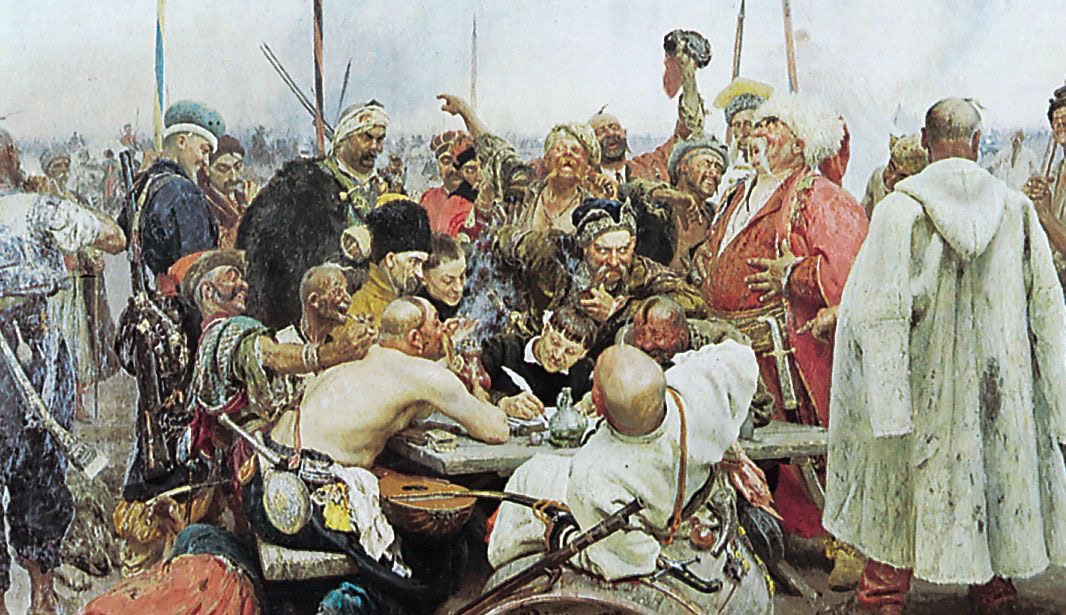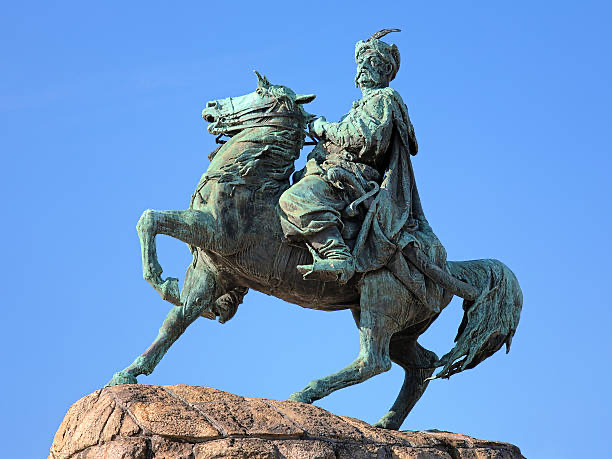Back to article index
Previous
COSSACKS AND JEWS

Ilya Repin: The Zaporozhian Cossacks writing a mocking message to the Sultan Mehmet IV
The Cossacks were, in their origins at least, Orthodox Christian peasants, speaking the language that would later develop into Ukrainian. This was not, as Russians like to think, a dialect of Russian but, like Russian, it was a derivative of the language originally spoken in the Kiev-based 'Kingdom of Rus.' The Orthodox 'Ruthenians', as they were called, were those descendants of the Kingdom of Rus who had been absorbed into Lithuania or Poland while the 'Russians' were the descendants of those who moved Northwards and Eastwards at first to Vladimir and then to Moscow. The Ruthenian aristocracy had folded into the Polish Catholic aristocracy and their peasantry was left unprotected at the bottom of the social hierarchy. To escape both religious persecution and the condition of serfdom, some of them had gone east to join military fraternities which were forming in the borderlands between the Polish-Lithuanian commonwealth and the lands along the Black Sea coast which were occupied by the Tatars, a Muslim people protected by the Ottoman Empire. It was as a bulwark against the Tatars on the border (the word 'Ukraine' means borderland) that the Poles tolerated or encouraged the existence of the Cossacks. But the Orthodox Cossacks nonetheless defined themselves in increasingly violent opposition to the Catholic Poles.
Nikolai Gogol's novel Taras Bulba is rather unspecific as to which of the Cossack risings it is dealing with but it seems to me to correspond to the rising about 1630 which is also the subject of The Night of Taras by Taras Shevchenko, Ukraine's national poet. Gogol, himself a Ukrainian whose earliest publications (Evenings on a farm near Dikenka, 1831-2, and Taras Bulba, 1835) deal with Ukrainian themes, gives a vivid idea of the resentment occasioned by the privileged position of the Jews. The specific grievance referred to here is that Polish landlords, not wanting to burden themselves with the tedious business of administering their own estates, often delegated the job to Jewish agents who thereby could get a level of control over the churches on estate lands. Since Orthodox churches were regarded with contempt in Poland, the landlords and their Jewish agents had more or less uncontrolled power over them, though I couldn't say if they really did abuse it in the manner described, first in Shevchenko's poem:
Unbaptised up to manhood grow
The children of our race,
For out of wedlock men must live;
Without a priest they die;
Our faith to Jewry has been sold
And locked our churches lie!
Like blackbirds covering a field,
The Poles and Uniates
Come swooping down. (3)
(Uniates were Ruthenians who had converted to Catholicism but allowed to maintain those parts of the old Eastern rite deemed compatible with Catholic doctrine).
(3) Readable English translations of Shevchenko's poems can be found at https://taras-shevchenko.storinka.org
And then by Gogol:
'"Such times have come that now even the holy churches are not ours."
"How do you mean, not ours?'
"Nowadays they are leased out to the Jews. If you don't pay a Jew beforehand, you cannot serve mass."
"What are you talking about?"
"And if a Jewish dog does not put a stamp with his unbaptised hand on the Holy Easter Cake, one cannot consecrate the cake."
"He is lying, comrades; it cannot be that an unbaptised Jew puts a stamp on the Holy Easter Cake."
"Listen! I've more to tell you: and the Catholic priests are driving now all over Ukraine in their two-wheeled cars. And the trouble is not that they ride in their carriages, but that the Orthodox Christians and not horses pull them. Listen! There's more to tell: they say the Jewesses are making themselves petticoats out of the priests' vestments. These are the things that are going on in the Ukraine, comrades!"'
I don't suppose that piece of dialogue - or the assault on the local Jews accompanying the Cossacks as traders that follows - features in he Hollywood film version of Taras Bulba, starring Yul Brynner.
The second half of the seventeenth century was dominated by the rising led by Bohdan Khmelnitsky which had a huge, traumatic effect, not just on Jews in Poland but on Jews throughout the world, it was accompanied by such violence and spoliation and destruction of Jewish property. Poliakov (p.400) describes the consequences as follows:
'From the second half of the seventeenth century they were no longer the principal bankers of the country - this role passed to Christian capitalists, above all the religious communities, churches and monasteries, whose wealth, mainly in land, had remained intact. The Jews, both communities and individuals, were in debt to them; the chronic indebtedness of the kahals, through their desperate efforts to refloat the Jewish economy, became a major social problem for Poland and continued to get worse through to the end of the eighteenth century. In 1765, the Polish diet suppressed the 'Council of the Four Lands', the Jewish federating organisation … So ended the Jewish semi-state autonomy …'
Seeking the means of making a living, many Jews 'installed themselves in rural areas as innkeepers, tavern keepers, artisans or peddlers, most of them living in extreme poverty.'
From a Ukrainian nationalist point of view the Khmelnitsky rising is an ambiguous event. On the one hand it did establish for a period of time a semi-independent self-governing entity - the 'hetmanate' - which could be regarded as a fledgling Ukrainian state. On the other hand Khmelnitsky and his son and successor, in opposition to the Poles, had entered into an alliance with Russia which eventually resulted in the area East of the Dnieper being incorporated into Russia. Russians tend to regard Khmelnitsky with unmixed favour as the man who began the process of reunification of the Russian people. In 1954, celebrating the three hundredth anniversary of the Treaty of the 'Pereiaslav Agreement' between Khmelnitsky and the Muscovite government, the Central Committee of the CPSU issued a series of 'theses' which declared:
'In the war of liberation, the Ukrainian people were led by an outstanding statesman and soldier. Bogdan Khmelnitsky. The historic merit of Bogdan Khmelnitsky lies in the fact that, while expressing the age old aspiration and hope of the Ukrainian people - close unity with the Russian people - and while giving leadership to the process of building Ukrainian statehood, he correctly understood its purposes and prospects, realised that the salvation of the Ukrainian people could be achieved only through unity with the great Russian people and worked perseveringly for the reunion of the Ukraine with Russia.' (4)
(4) Quoted in Frank E. Sysyn: 'The Khmel'Nyts'kyi Uprising: A characterisation of the Ukrainian revolt', Jewish History, vol 17, No 2, 2003, p.117
Not much regard being paid here to the possible feelings of Poles or Jews.

Statue of Bohdan Khmelnitsky in Kiev
The Cossack system was suppressed both in Poland and in the newly acquired Russian area in the eighteenth century but Poland was still subject to a series of Orthodox peasant uprisings culminating in the extremely violent 'Koliishchyna' revolt of 1768 which contributed to the collapse of Poland and its division between Austria, Prussia and Russia. The Koliishchyna revolt is celebrated in Shevchenko's most important, highly influential poem Haidamaky.